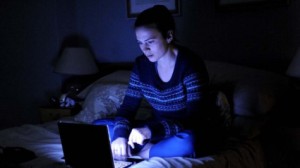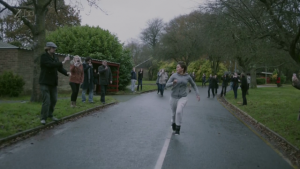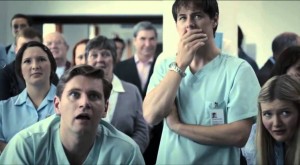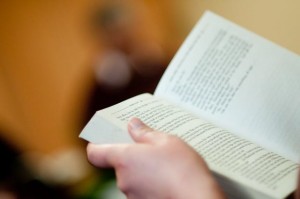Earlier this month, I had the privilege of seeing Grammy-Award winner St. Vincent perform in Rochester. After the opening act an seconds before the performers took to the stage, an automated voice requested that we refrain from digitally recording our experience so we could thoroughly enjoy it. This is presumably related to their hit song, Digital Witness, (listen below!) which was ranked 24th in Pitchfork’s top 100 songs of 2014. The catchy tune conveys a darker, relevant message about technology’s way of taking over our lives and turning us into iPhone zombies, as you can see in the video below.
The idea of technology taking over our lives is prevalent in pop culture other than music, presented more humorously in Portlandia. This clip shows how greatly invested in technology we are as a collective society, that if we were to separate from it, we’d almost cease to exist. Portlandia is a funny show, but here it got #real. Another recent presentation of technology taking over our natural lives is the 2013 movie Her, where a man falls in love with his operating system. It has clear parallels to Kurt Vonnegut’s older short story EPICAC (summary), yet it is still relevant enough to be made into a movie today. In this media, technology is shown as a substitute for actual human relationships, which social media facilitates today.
Over spring break, my brother introduced me to a British television series entitled “Black Mirror.” He called it the British Twilight Zone. Sounds pretty cool! Google provides a concise and spooky summary: “Suspenseful satire with a techno-paranoia bent, the ‘Black Mirror’ is all about personal technology.” Even cooler! I watched the 6-episode series in a day. The irony of being hooked to my laptop watching a series about our future damnation due to technology was almost unbearable, but log onto Netflix and I bet you’ll do the same. I found these futuristic societies simultaneously familiar and foreign. Each episode, in some way or another, revolved around a screen. The abilities of technology exceeded our own, but the interaction of people with their devices was no different than the typical individual with an iPhone.
summary: “Suspenseful satire with a techno-paranoia bent, the ‘Black Mirror’ is all about personal technology.” Even cooler! I watched the 6-episode series in a day. The irony of being hooked to my laptop watching a series about our future damnation due to technology was almost unbearable, but log onto Netflix and I bet you’ll do the same. I found these futuristic societies simultaneously familiar and foreign. Each episode, in some way or another, revolved around a screen. The abilities of technology exceeded our own, but the interaction of people with their devices was no different than the typical individual with an iPhone.
The three episodes that in particular haunted me the most were S1E1, “The National Anthem,” S2E1, “Be Right Back,” and S2E2, “White Bear.” “The National Anthem” explores the idea of cyber terrorism in what appears to be a modern day UK. If you asked me to define cyber terrorism  prior to watching, I would’ve guessed hackers or a virus. Something regarding information or money, maybe. This episode explores humiliation and a life-or-death kidnapping situation as a method of promoting cyber terrorism. Technology is a weapon in the digital age and we need to be aware of the danger that lies in the internet’s anonymity. “Be Right Back” seems more futuristic than the previous episode. The young couple featured regularly use social media, as many people do today. The information they shared via social networks is able to help recreate the husband after his death by reading through old messages, learning how he types, and automating a response. To me, the eeriest aspect of this episode was not the life-like robot, but that programs like this seem feasible in the future. Sending automated messages is already possible, tailoring content from existing users doesn’t seem to be too much of a stretch in the near future. What I find to be to most intense episode, “White Bear” shows how
prior to watching, I would’ve guessed hackers or a virus. Something regarding information or money, maybe. This episode explores humiliation and a life-or-death kidnapping situation as a method of promoting cyber terrorism. Technology is a weapon in the digital age and we need to be aware of the danger that lies in the internet’s anonymity. “Be Right Back” seems more futuristic than the previous episode. The young couple featured regularly use social media, as many people do today. The information they shared via social networks is able to help recreate the husband after his death by reading through old messages, learning how he types, and automating a response. To me, the eeriest aspect of this episode was not the life-like robot, but that programs like this seem feasible in the future. Sending automated messages is already possible, tailoring content from existing users doesn’t seem to be too much of a stretch in the near future. What I find to be to most intense episode, “White Bear” shows how  technology inhibits us from being helpful, and actively illustrates technology users as useless, mindless zombies. I don’t want to spoil any of the episodes, but if you choose to watch them, you’ll see! I find social media and technology today helpful, but often see instances where it can become a crutch for actual interactions or weaken our abilities. Would cyberbullying, isolation, increased aggression/violence or decreased sense of boundaries/social skills could make a compelling episode of Black Mirror? Yes, probably. And they’re all effects technology has on us today.
technology inhibits us from being helpful, and actively illustrates technology users as useless, mindless zombies. I don’t want to spoil any of the episodes, but if you choose to watch them, you’ll see! I find social media and technology today helpful, but often see instances where it can become a crutch for actual interactions or weaken our abilities. Would cyberbullying, isolation, increased aggression/violence or decreased sense of boundaries/social skills could make a compelling episode of Black Mirror? Yes, probably. And they’re all effects technology has on us today.
We can laugh about this, sing about it, cringe at it or even turn it into a twisted romance. From all angles, it’s clear that technology is taking a bit of us from ourselves. Technology is supposed to simplify our lives, not control them. And while it’s easy to blame this problem on technology, why do we keep using it? Maybe the problem is with us. Are we an addicted generation that will spiral into an uncertain future?

 wegian teens read from paper and PDFs. The students were dived into separate groups and then they were tested on plot summary. Guess who did better? Of course, it was the paper readers! The use of paper gave them a sense of progress, and although it was unconscious, it helped them map the plot better than those reading from a screen.
wegian teens read from paper and PDFs. The students were dived into separate groups and then they were tested on plot summary. Guess who did better? Of course, it was the paper readers! The use of paper gave them a sense of progress, and although it was unconscious, it helped them map the plot better than those reading from a screen.  This observation is by no means a cry to end the digitalization of literature, rather a caution on how and when you use your device to read. Reading in the 2 hours before bed, as 90% of Americans do, is a terrible idea. The backlight on iPads and computers is blue, which we are very sensitive to. Overdosing on this light, which the digital world forces us to do on a daily basis,
This observation is by no means a cry to end the digitalization of literature, rather a caution on how and when you use your device to read. Reading in the 2 hours before bed, as 90% of Americans do, is a terrible idea. The backlight on iPads and computers is blue, which we are very sensitive to. Overdosing on this light, which the digital world forces us to do on a daily basis,